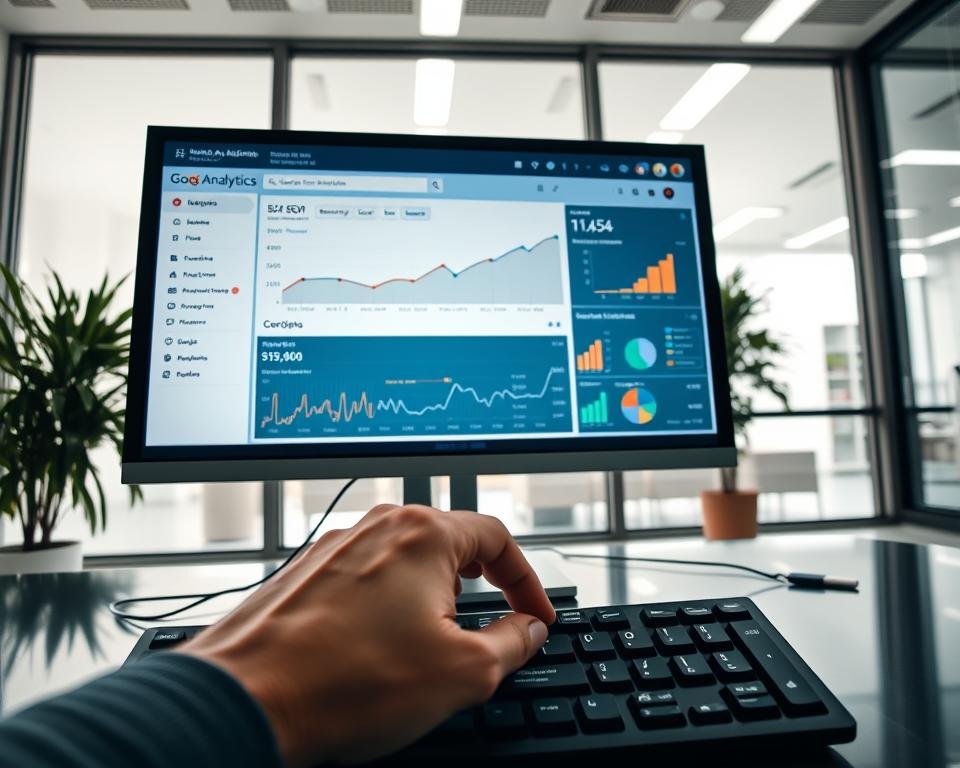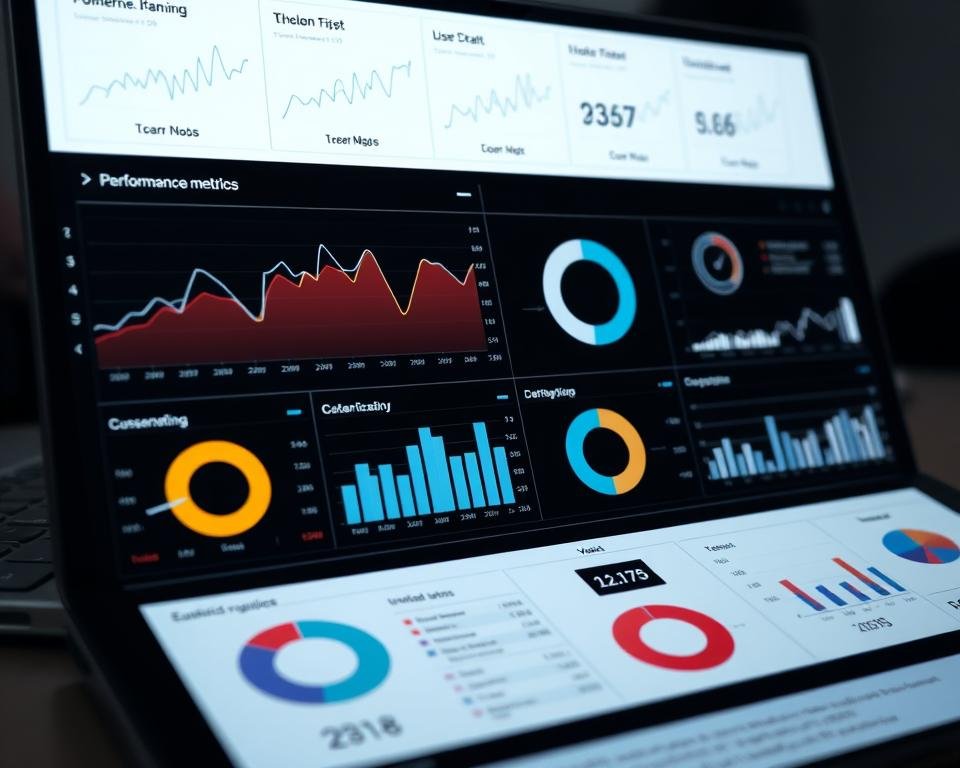As an SEO professional, I use data a lot. It helps me make websites better. Knowing the right metrics is key to improving search engine rankings.
I check website performance with Google Analytics. It shows me where to improve. This helps me make my SEO strategies better.
In this article, I’ll tell you about important metrics. They help make your website better for search engines. By the end, you’ll know how to use data to boost your online presence.
Key Takeaways
- Understand the importance of using data to drive SEO decisions
- Identify key metrics to watch for optimizing website performance
- Learn how to leverage data to enhance search engine rankings
- Discover how to use data to inform SEO strategies
- Improve your online presence by making data-driven decisions
Understanding Google Analytics and SEO
Google Analytics and SEO work together well for digital marketing. They help you understand your website better. This way, you can make smart choices to improve your online presence.
What is Google Analytics?
Google Analytics is a powerful tool for website traffic analysis. It shows how users interact with your site. It tracks things like page views and how long people stay on your site.
Importance of SEO in Digital Marketing
SEO is key in digital marketing. It helps your website rank better in search engines. This means more people can find your site easily.
Using Google Analytics with SEO lets you see how your efforts work. You can then make your SEO better. This keeps your website ahead in the digital world.
Key Metrics to Monitor for SEO Success
To succeed in SEO, it’s key to track the right metrics. Monitoring performance metrics shows how well your site is doing. It’s about visibility, user engagement, and conversion. The right metrics are essential for SEO success.
Organic Traffic Overview
Organic traffic is vital for SEO. It shows how many visitors find your site through search engines. Tracking organic traffic shows if your SEO is working. It helps see which keywords and content attract the most visitors.
Seeing organic traffic go up is good. It means your SEO is working. But, if it goes down, you might need to fix your content or technical SEO.
Bounce Rate Insights
Bounce rate is another key metric. It shows how many visitors leave without doing anything else. A high bounce rate means your content might not be interesting. It helps find pages that need better content or user experience.
Understanding bounce rates helps improve your content. This can make your SEO better by keeping users engaged.
Conversion Rate Tracking
Tracking conversion rates is important. It shows how well your site turns visitors into customers. Monitoring conversion rates checks if your SEO is effective. It looks at more than just traffic.
By looking at conversion rates, you can find ways to improve. This could be better calls-to-action or a better user experience. Both can help increase conversions.
Setting Up Google Analytics for SEO
To get the most from Google Analytics for SEO, setting it up right is key. You need to follow a few steps. These steps help you track and understand the important metrics for your SEO.
Account Creation
First, you must create a Google Analytics account. Sign in to your Google account and go to the Google Analytics website. Then, follow the steps to make a new property. You’ll need to give some basic info about your website.
Linking to Your Website
Next, link Google Analytics to your website. You do this by adding a tracking code to your site’s pages. This code gathers data on your visitors and how they act on your site.
Setting Up Goals and Events
Setting up goals and events in Google Analytics is important. It lets you track key actions on your site that are vital for SEO. Goals might be about form submissions, purchases, or downloads. Events track things like button clicks or video plays.
Here’s a quick rundown of the main steps and why they matter for SEO:
| Step | Description | Importance for SEO |
|---|---|---|
| Account Creation | Sign up for Google Analytics | Enables data collection for SEO analysis |
| Linking to Website | Add tracking code to your website | Collects visitor and behavior data |
| Setting Up Goals and Events | Define and track specific website actions | Helps measure the success of SEO strategies |
By doing these steps, you make sure your Google Analytics is ready. It will give you useful insights into your site’s performance. This helps you make smart choices to boost your SEO.
Analyzing Traffic Sources
The first step in making your website better is to know where your visitors come from.
Looking at traffic sources helps you see which ones work best for you. This lets you focus on the most important ones for your website.
Organic Search Traffic
Organic search traffic means people find your site on search engines without seeing ads. Watching this traffic shows how good your SEO is.
- Find out which keywords bring in the most visitors.
- See what content your visitors like.
- Make pages that don’t do well better for search engines.
Referral Traffic
Referral traffic is when people visit your site from other websites. It’s great because it shows you have partners or people talking about you.
- Keep track of where your referral traffic comes from.
- Check if the traffic is good for your content.
- Make your content better match what people are sharing.
Social Media Impact
Social media can send a lot of visitors to your site. Knowing how social media affects your traffic helps you improve your social media plans.
- Watch social media to see how it helps your site.
- Change your content based on what works on social media.
- Use social media tools to help your SEO.
By looking at these sources, you can really understand your website’s traffic. Then, you can make smart choices to improve your SEO.
Monitoring User Behavior on Your Website
Looking at how users act on your site helps you see what needs work. It’s key to making your site better for everyone. This way, you can make smart choices based on real data.
Page Views per Session
Page views per session shows if your site is fun to explore. More views mean people like to see more of what you have.
To get more page views, try these:
- Make it easy for users to find more stuff
- Make your content better and more relevant
- Use calls-to-action that make people want to see more
Average Session Duration
The average time people spend on your site is important. Longer times mean they find your content interesting and useful.
Things that can help with this include:
| Factor | Description | Impact |
|---|---|---|
| Content Quality | Relevant and high-quality content | Positive |
| Site Navigation | Easy and intuitive navigation | Positive |
| Loading Speed | Fast loading times | Positive |
Unique vs. Returning Visitors
Knowing how many new vs. returning visitors you have is important. It shows if you’re good at bringing in new people and keeping the old ones coming back.
- Keep your content fresh to bring people back
- Use social media to find new people
- Work on your SEO to get more visitors
Leveraging Google Analytics for Keyword Insights
Learning to use Google Analytics for SEO can really help you find and use the best keywords. By looking at the data from Google Analytics, you can make your SEO better. This way, you can match what your audience is looking for.
Google Analytics has lots of useful info for making your content better. The Search Queries Report is a big help. It shows you which keywords bring people to your site.
Using Search Queries Report
The Search Queries Report in Google Analytics is great for seeing which keywords work. To find it, go to “Search Console” in Google Analytics and choose “Queries.” This report shows you the keywords that get impressions and clicks.
Key benefits of using the Search Queries Report include:
- Discovering new keywords for your content.
- Finding out which keywords bring the most traffic and sales.
- Improving your content to match the search queries that work.

Identifying High-Performing Keywords
To find the best keywords, look at the Search Queries Report. Look for keywords with high click-through and conversion rates. These keywords bring in traffic and lead to actions on your site.
Steps to identify high-performing keywords:
- Sort the Search Queries Report by CTR and conversion rate to find top keywords.
- Check the content that ranks well for these keywords to see what works.
- Make other content better to target these top keywords.
By following these steps and using Google Analytics, you can make your SEO better. Focus on the keywords that really matter.
Understanding Audience Demographics
Google Analytics data can really help your SEO. Knowing who visits your site lets you make your SEO better. This way, you meet their needs and likes.
Regional Insights
Google Analytics gives you insights on where visitors come from. This info helps you make your content better for certain places. It boosts your local SEO.
If lots of visitors are from a certain city or country, make content for them. This can help you rank better in local searches.
Age and Gender Breakdown
Knowing your audience’s age and gender helps you make better content. You can tailor your messages and content to reach your target audience.
If your site is popular with young adults, make content for them. Use language and topics they find interesting.
Devices Used by Visitors
Google Analytics also shows what devices visitors use. This includes desktops, tablets, and mobiles. It’s key to make sure your site works well on all devices.
| Device Type | Percentage of Users | Impact on SEO |
|---|---|---|
| Desktop | 60% | Ensure content is easily accessible |
| Mobile | 30% | Optimize for mobile responsiveness |
| Tablet | 10% | Ensure compatibility with various screen sizes |
Using these insights, you can improve your SEO. This makes your strategies more effective for your audience.
Measuring Site Performance
Google Analytics gives you insights into your site’s performance. It helps you make smart choices for SEO. By looking at important metrics, you can find what needs work. This improves both user experience and search rankings.
Loading Speed Effects on SEO
How fast your site loads is key for SEO. A slow site can cause people to leave quickly. This hurts your rankings. Google Analytics tracks your site’s speed and shows you which pages to fix.
Key metrics to monitor include:
- Average page load time
- Server response time
- Page speed suggestions
To speed up your site, optimize images and use browser caching. Also, make CSS and JavaScript files smaller. This will make your site load faster.

Mobile Responsiveness Metrics
Most people use mobile devices to visit websites. So, making your site mobile-friendly is very important. Google Analytics shows how your site works on different devices.
Key mobile responsiveness metrics to track include:
- Mobile page speed
- Mobile usability issues
- Device-specific bounce rates
Having a mobile-friendly site improves user experience. It also helps your search rankings.
Creating Custom Reports for SEO
Google Analytics lets you make custom reports for SEO. You can focus on the metrics that matter most. This way, you understand your website better and make better SEO choices.
Importance of Customization
Customizing your reports in Google Analytics is key. It helps you focus on what’s important for your SEO goals. Generic reports have too much data that’s not useful. Custom reports let you:
- Find the most important SEO metrics for your business
- Make your analysis easier
- Make choices based on the right data
Key Metrics to Include in Reports
When making custom SEO reports, include certain key metrics. These metrics give a full view of your website’s SEO performance.
| Metric | Description | Importance for SEO |
|---|---|---|
| Organic Traffic | The number of visitors from organic search results | High – shows how well your SEO works |
| Bounce Rate | The percentage of visitors who leave without doing more | Medium – affects user experience and SEO |
| Conversion Rate | The percentage of visitors who do what you want | High – directly affects your business goals |
By adding these metrics to your reports, you’ll understand your website’s SEO better. You’ll also see where you can get better.
To get even better at SEO analysis, look at more metrics. Check page views per session, average session time, and what devices visitors use. These details can help you improve your SEO and your website’s performance.
Making Data-Driven SEO Decisions
Google Analytics is key for bettering a website’s search ranking. It helps by looking at how users act, where they come from, and what’s on the page. This way, I can spot what needs work and make plans to fix it.
Strategy Development
Creating a smart SEO plan means looking at important numbers like website visits, how long people stay, and if they buy anything. This helps me see where I can make the site better. For example, I can work on the page titles, descriptions, and content.
Testing and Optimization
Testing and tweaking are vital for a good SEO plan. Keeping an eye on how things change helps my site rank better and get more visitors. I use things like A/B testing and making content better to improve the site and user experience.
